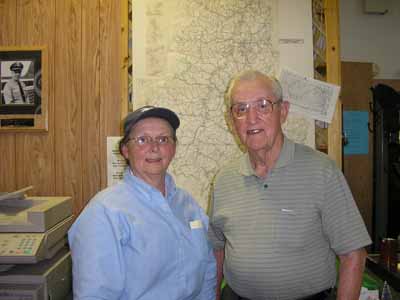Damon and Lucy Ann West
Damon West grew up in Gilmer County, but he remembers the Weston State Hospital from summertime visits to his Grandfather Matthew, who lived in Lewis County. They would travel to Weston by horse and buggy, and when they got into town, a cousin of his would take the team of horses to livery sable where they would stay for the duration of the visit.
While he was there, Grandpa Matthew would take him through the railroad yards to the hospital. His grandfather knew his way around the hospital, and he would take Damon around the whole building. Damon remembers the highlight was "to see the size of it," especially the size of the kitchen. During that time, the hospital had about 2,000 people there, and for Damon, "to see a kitchen and the number of cooks that they had to prepare a meal was just astounding. The hospital was very fascinating to me at that time."
They never went out to see the farm, but they did go to back of the hospital, where Damon got to see the self-sufficiency of the hospital. Later in years, when his brother was there testing cows, he said there were still a hundred head of cows. The hospital also had two gas wells which were used for lighting the hospital.
Grandpa Matthew also took Damon through the wards. During that time, the wards were not single rooms, but rather, one large room. They reminded him of military barracks, with beds on either side of the aisle, all in one room.

Grandpa Matthew would stop and talk to some of the patients, who weren't that "bad off." They like and appreciated visitors. Damon remembers seeing patients, sometimes five, sometimes twenty-five, up along the fence talking to people passing by. "You have to consider that they were from extreme mental cases to very, very light cases," Damon recalls. Some of them were only there because they didn't have a home or they were in jail for a "minor offense that was more mental than physical."
Damon was also fascinated by the fence around the hospital. When he was younger, he thought of it as a fence or pen to keep the people in. But many of the patients actually had permission to walk about the town. The people of Weston thought of the patients as part of the town, and most weren't afraid of them. Damon remembers his grandparents showed no sign of it.
Damon remembers in 1932 and 1933, his coach and principal at Troy High School was "quite an athlete." He was in an independent semi-pro league that would play other teams from the region at the Weston State Hospital baseball field. He had a car with a rumble seat, and when he had a game in Weston, he would take all the boys "he possibly could with him in the rumble seat" and they would "ride twenty miles standing and holding onto the running board of the car." Damon recollects, "The interesting thing was the greater part of the crowd was patients. When you've got two thousand people there, there's probably a good hundred of them that are sane as we are."
Click here to listen to Damon.
Not only were there baseball games on the grounds, but also football games. In the 1930s Weston High School played their football games there. Damon remembers there was not enough open space, and there was a tree on the football field. This gave the home team a true advantage, as they were used to playing with the obstacle.
When Damon was an adult, he became the director of the neighborhood youth corps. The boys and girls worked under Damon in various departments of the hospital.
One time a boy was assigned to work in the garage and he refused to do so. The supervisor called Damon and asked, "What do you do with him?" Damon had the supervisor send the boy to send him to Mr. Ward. The next time Damon saw the boy he was pushing a wheelbarrow. "He'd have done better washing cars!" Damon said.
There were many kids who worked in the kitchen. One time they gave a picnic with cake and everything. Some patients made it known they wanted a handout, but the supervisor warned them not to comply.
While Damon was working there, Lucy Ann, his daughter, was a secretary in the transportation department. His son, Larry Wilson, also worked there one summer.
"It did a tremendous job of looking after our town," Damon remembers, "Just like you have a school that looks after boys and girls."
Damon remembers the craft wing on the second floor in the 50s and 60s. There were three sisters who worked in the hospital and two of the worked in that wing. There were a lot of crafts available, such as sewing and ceramics.
One summer when Damon was working there he drove behind the building to park and a big man came over to his car and patted Damon on the shoulder when he got out of the car. "I'll watch your car for you," he said. Every morning, that man was there, diligently waiting for Damon so he could watch his car for him. For Damon, the man wasn't insane, he was just a good friend.
Click here to listen to Damon.
In later years, Damon was excited when a Veterans' building was built on the hospital grounds after WWII. Unfortunately, later the building was torn down.
Lucy Ann remembers one summer the community was hosting Christmas in July, an event in which a big Christmas tree was put up in the front hall of the hospital with gifts that were bought by community members as donations. One patient commented, "They tell us we're crazy, and they're having Christmas in July!"